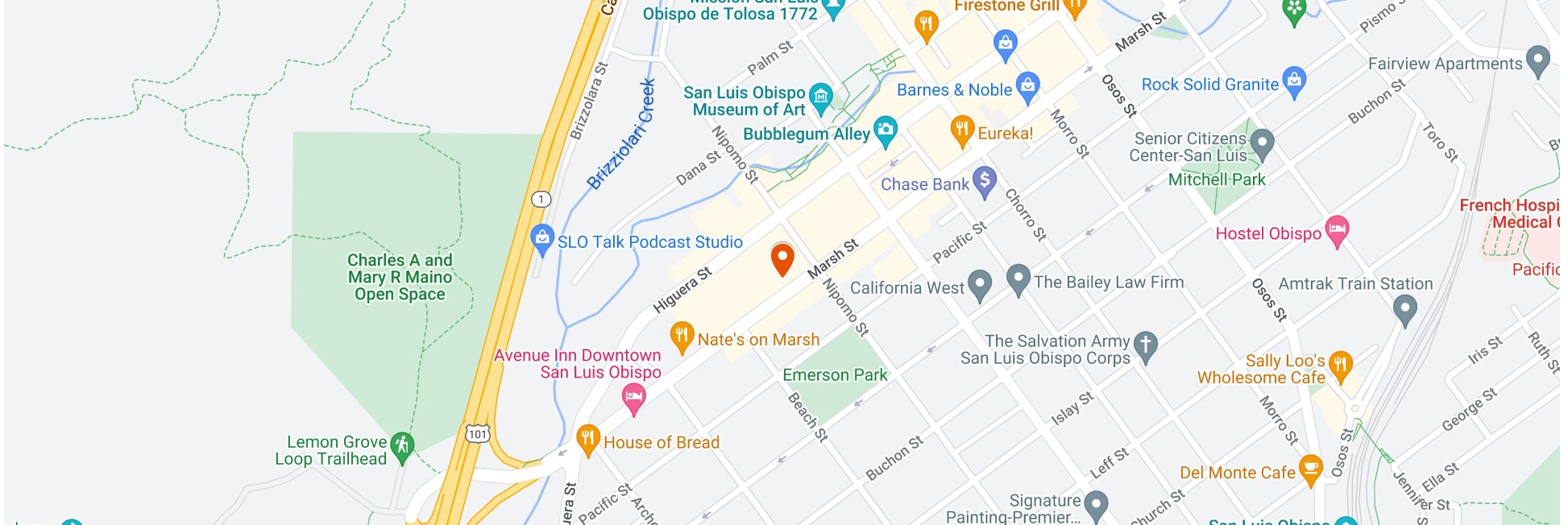Driving under the influence is a criminal offense in California, attracting multiple penalties for parties found guilty. Additionally, being a repeat offender attracts more legal consequences that increase in severity with every re-arrest. Therefore, a fourth DUI offense can attract serious legal consequences that require you to work with a skilled defense attorney to avoid it. Moreover, you want to work with an experienced team to ensure they have sufficient information about defending a repeated offense. Doing so increases your chances of receiving a favorable case outcome, including a sentence reduction or acquittal.
At San Luis Obispo DUI Attorneys, we help clients facing repeat DUI charges navigate their criminal court or DMV cases. Our experience handling DUI cases equips us with the skill and knowledge necessary to help you avoid serious legal penalties. Moreover, our team will assess your case facts and prepare defenses tailored to meet your needs. Therefore, you can depend on us to deliver quality legal services and walk you through your 4th DUI offense charge.
The Nature of 4th DUI Offense Charges
You will be answerable for drunk driving upon facing a fourth DUI offense charge. Subsequently, the prosecutor will likely press the charges based on violating section 23152 of the California Vehicle Code. Under the provisions of this section, it is unlawful to drive under the influence with a blood alcohol concentration (BAC) level of 0.08%.
Subsequently, if a traffic officer arrests you for violating the law, they press DUI charges and forward your case to the prosecutor for further processing. You should note that since the fourth DUI offense is a repeat crime, you may face misdemeanor or felony charges. The nature of your charges varies depending on the case circumstances and previously violated DUI laws.
Once the arresting officers process your arrest details, they will forward them to the Department of Motor Vehicles (DMV) and the prosecutor. Typically, many DUI cases are resolved in the DMV office under the supervision and discretion of a qualified DMV officer. However, the prosecution team can also file a criminal case against you.
The criminal matter proceeds mostly when your DUI causes subsequent outcomes like accidents and injuries. Nevertheless, the prosecutor can file a case against you to increase the chances of enhanced punishment. Their basis for doing this is because you are a repeat offender with three previous DUI records.
Hence, you should prepare yourself adequately by partnering with your defense attorney. Their assistance is useful both in a DMV hearing and court proceedings. Since their experience extends to both settings, you can worry less about spending too much money to retain two separate legal representatives.
Elements of Crime for the Prosecutor to Prove
If the prosecutor elects to file a criminal lawsuit for your fourth DUI charge, they must prepare a case for court presentation. In doing so, they need to comply with criminal law requirements, specifically on the type of evidence they produce. Usually, the burden of proof for criminal cases rests on the prosecutor unless you, as the defendant, raise a significant fact that requires proof.
Additionally, the prosecutor must observe a high standard of proof, which requires them to show that you are guilty beyond a reasonable doubt. Subsequently, the prosecutor must focus their arguments on each element of the crime to establish that no doubt arises from how they present their case.
Further, your attorney should remain keen on all the court presentations to ensure they pick up on inconsistencies in the prosecutor’s case. In doing so, they will have a better advantage in questioning the prosecutor’s arguments and raise your chances of a favorable outcome.
The following are the main elements of the crime for the prosecutor to prove:
You Were Driving a Vehicle
Firstly, it is important to show that you were operating a vehicle, meaning that you were driving it. Presenting this fact is necessary because it demonstrates that you acted contrary to the prohibitions under section 23152. Thus, driving a vehicle indicates that you controlled it while in an impaired state of mind.
The prosecutor can rely on various evidence sources to support this crime element. Firstly, they may retrieve footage of you driving the car and approaching the DUI traffic stop before your arrest. Alternatively, they can refer to verified police reports, particularly from the arresting officer who watched you approach the DUI stop for a test.
These reports may contain specific information about how you were driving, which may be disadvantageous for your case. For example, if the reports indicate that you were driving dangerously or recklessly, the descriptions will further support the prosecutor’s case that you were under the influence.
You Drove Under the Influence of Alcohol
Second, the prosecutor should demonstrate that you were under the influence when driving, further violating the prohibitory legal provisions of the Vehicle Code. To do this, they can produce evidence of your physical signs of intoxication. For example, if you have slurred speech, red eyes, and poor mind-body coordination, they can produce evidence on the information to build their case.
Notably, proving that you were under the influence of alcohol alone is insufficient to prove the DUI offense charge. The prosecutor should also demonstrate that your intoxication levels exceeded the legal limit. Doing this is important because the legal limit is set to prevent inebriation beyond the point of controlling a vehicle effectively.
To this end, the rule's specifics imply that having alcohol in your system alone is not enough to attract DUI charges. The prosecutor should further prove that the alcohol was high and interfered with your driving ability.
Your Blood Alcohol Concentration Level Exceeded the Legal Limit
Based on the requirement to demonstrate that you exceeded the legal BAC limit, the prosecutor should also produce evidence of your readings. Usually, the legal limit is set at 0.08%, making any alcohol concentration above this too much for any driver to operate a vehicle.
Normally, a traffic officer administering BAC tests will use a breathalyzer device to record the levels. Thus, you need to blow into the device, which measures the alcohol content in your breath. Based on the findings, the officers will determine whether to arrest you because the alcohol percentage will show.
The prosecutor may also present the actual breathalyzer device used to test you in court. They do this to demonstrate that it was a functional device with no defects, so the readings are accurate. If they do so, you cannot rely on defenses surrounding the defectiveness of the device. Nonetheless, your attorney will advise you on alternative approaches to use.
You Have Three Prior BAC Offense Records
Lastly, since you will be accused of violating DUI regulations for a fourth time, the prosecutor must also prove that you have three prior DUI records. To do this, they will extract your previous case records, including the pleadings, defense statements, and judgments. These documents should be original and verified as court records using stamps.
Additionally, the prosecutor may retrieve DMV records if your previous charges were heard and resolved at the DMV office. Therefore, they need to show the DMV location where you attended the hearing and the DMV officer’s findings about your case.
You can also expect the prosecution team to find and use your probation reports, community service records, and other diversion records. Retrieving these documents is in line with demonstrating that you received a conviction and served time undertaking court orders.
Based on these records, it is more clear that you received a DUI sentence previously. Usually, the prosecutor will retrieve three previous records by collaborating with the justice department, so the records are most likely legitimate. Nonetheless, if you suspect some records are fabricated, you want to inform your attorney about it as soon as possible.
Defenses to a Fourth DUI Charge
Upon completing the prosecution, the court allows you to raise defenses to counter the allegations against you. Subsequently, you need to prepare adequately for the defense hearing by partnering with your defense lawyer and providing any relevant information.
Additionally, you can use the preparation period to inquire about the assistance you can provide during the hearings. For example, you can inquire whether to testify or find additional evidence sources to support your case. Your defense lawyer will guide you on the best strategy to apply. Some workable defenses include the following:
The Arresting Officer Did Not Have Probable Cause to Apprehend You
Forming probable cause is necessary for a traffic officer, as it informs their decision to arrest you. Subsequently, any arrest without probable cause is invalid, and you can raise your concerns with the court to review your entire case.
When using the argument as a defense, you want to provide specific information on why you strongly believe that the arresting officers did not form probable cause. For example, if the officers stopped you and immediately handcuffed you without assessing your state, they are less likely to have reasonable suspicion of your DUI.
Similarly, you can also use the argument if the officers arrested you at a separate location from the DUI stop for alleged drunk driving. Your basis will be that the officers did not verify whether you were drunk and could not have undertaken a lawful arrest.
You can use evidential sources like witness testimonies or statements from parties present at the arrest scene. Additionally, you can produce video evidence if you have a dashboard camera that depicts the nature of your arrest. Based on the details, you will have shown that your arrest was unlawful.
The Blood Sample Used to Test Your BAC Levels Was Contaminated
Alternatively, you can defend yourself by showing that the blood sample the investigation law enforcement officers used to test your alcohol concentration was contaminated. The goal in presenting this defense is to show that your results were inaccurate, meaning that you had not exceeded the BAC limit.
To do this, you need to retrieve information from the testing laboratories, specifically from an authorized professional who participated in processing your samples. Your defense attorney can help you contact them and request them to produce the reports indicating a sample error.
As professionals giving opinion evidence, the sample officers’ testimonies should remain neutral despite appearing as defense witnesses. The lack of neutrality can trigger the prosecutor to raise issues with the professional’s credibility, which would be detrimental to your case.
If the findings are true and persuasive, the presiding judge can make appropriate orders, including a case dismissal, if no other sample is available. They can do this because the entire DUI case depends on whether you exceeded the BAC limit. So, without proof from the readings, proceeding with the case would violate the laws of a fair trial process.
The Inaccurate BAC Readings Arise From Acid Reflux
If you suffer from acid reflux, your BAC readings may have inaccurately shown a percentage exceeding the 0.08% threshold. The condition causes severe acidity, heartburn, and occasional stomach contents rising along the esophagus. Therefore, if you had taken a small amount of alcohol within the legal limit, it may be amplified under the breathalyzer test.
You need to present medical evidence of your acid reflux diagnosis to support your case. You can do this by contacting your doctor and requesting a report. Moreover, you can retrieve any prescription notes you have received on drugs to treat the condition. Thanks to the information, you are better positioned to justify your case in court and persuade the judge to reconsider the accuracy of the BAC findings.
Moreover, your doctor can appear as a defense witness to further support your claim. They will present their testimony as a professional, so you should expect their responses to be neutral. Despite this, the information they give will be to your advantage, as it further justifies that you have an actual condition.
You Undertook the Breathalyzer Test Using a Defective Device
Sometimes, breathalyzer devices are defective, resulting in inaccurate results. Consequently, you may face arrest and prosecution based on incorrect readings. Presenting a defense about the faulty device is a good strategy, provided you can justify the validity of your claims.
If you have information on how the device produced false results, you should present the information to your attorney and give them time to prepare arguments. Furthermore, you can try to retrieve the actual device as exhibition evidence to ensure you have further demonstrated how it altered the readings. As long as your attorney can assist in demonstrating that the device was defective, you can expect higher chances of a sentence reduction or a case dismissal.
Your Field Sobriety Test Was Not Properly Administered
Traffic officers also administer field sobriety tests to establish whether you are intoxicated before arresting you. In doing this, they can ask you to perform simple exercises that a sober person would find easy to undertake. For example, you may need to walk in a straight line or perform simple balance exercises to check on your mind-body coordination.
Depending on the results, the traffic officers can then determine whether to arrest you. Although sobriety tests are important, they should not be the only basis to determine whether you are drunk. Moreover, the officer in charge should administer them objectively. Thus, you can raise the issue as a defense if you suspect the tests were incorrectly administered.
Penalties for Committing a Fourth DUI Offense
You will face penalties if the judge finds you guilty of a fourth DUI offense. Notably, you may face either a misdemeanor or felony charges, depending on your case circumstances. The following are penalties available for fourth DUI offenders:
- A jail sentence of three months to one year in county jail when charged with a misdemeanor.
- Sixteen months, two or three years in prison when charged with a felony.
- Thirty months of mandatory DUI school attendance.
- A driver’s license revocation lasting for up to four years.
- Driving with a habitual traffic offender (HTO) status for three years.
- Installation of an ignition interlock device (IID) for four years.
Contact a DUI Defense Attorney Near Me
When you or a loved one face their fourth DUI offense charge, you must find a reliable legal team as soon as possible. You need to do this because repeat DUI offenses often attract harsh penalties that could have life-altering effects if found guilty. Thus, you want to understand the intensity of your charge and work towards avoiding serious legal repercussions. You need an experienced attorney ready to take on your case and provide quality legal advice and guidance.
With San Luis Obispo DUI Attorneys, you will work with a dedicated and experienced team of DUI attorneys who understand the importance of building strong defenses on your behalf. Upon receiving your case, we work hard to prepare persuasive arguments and evidence to support it for your benefit. Moreover, you can contact us at any time to receive additional support, especially when litigation matters are unclear to you. For more information on how to fight a 4th DUI charge, call us today at 805-321-1000.







